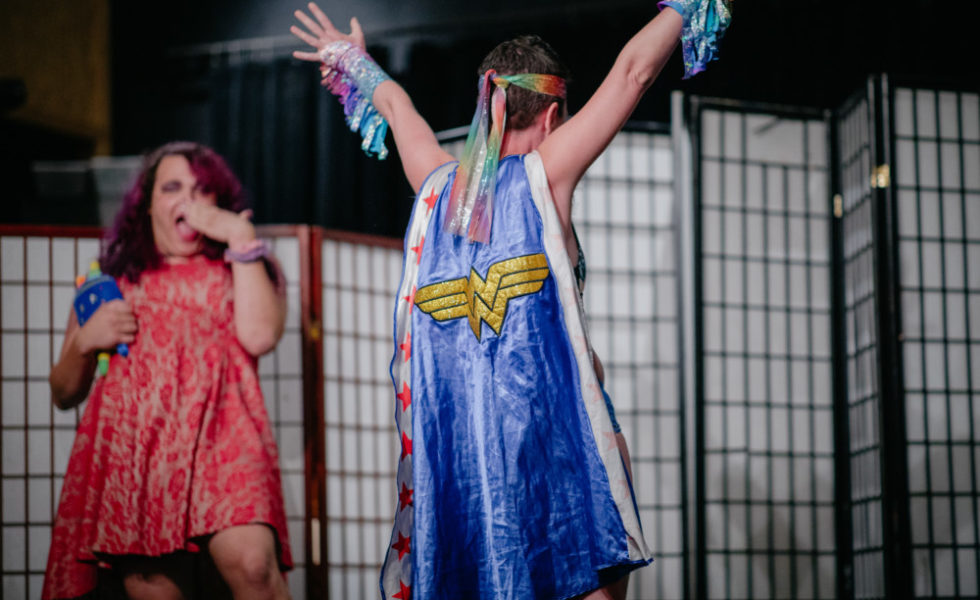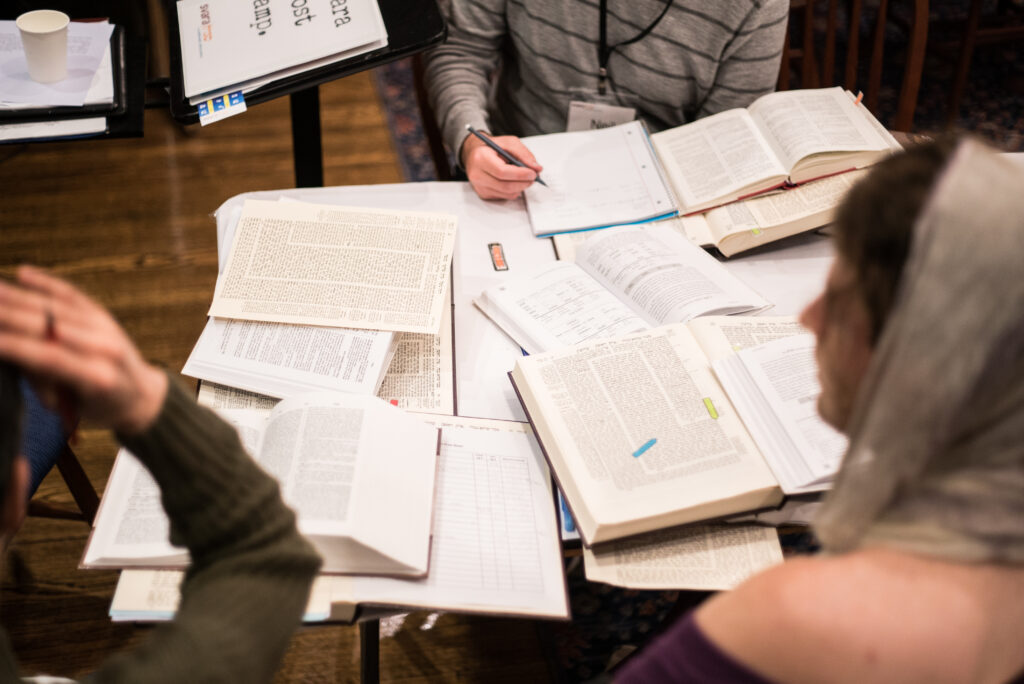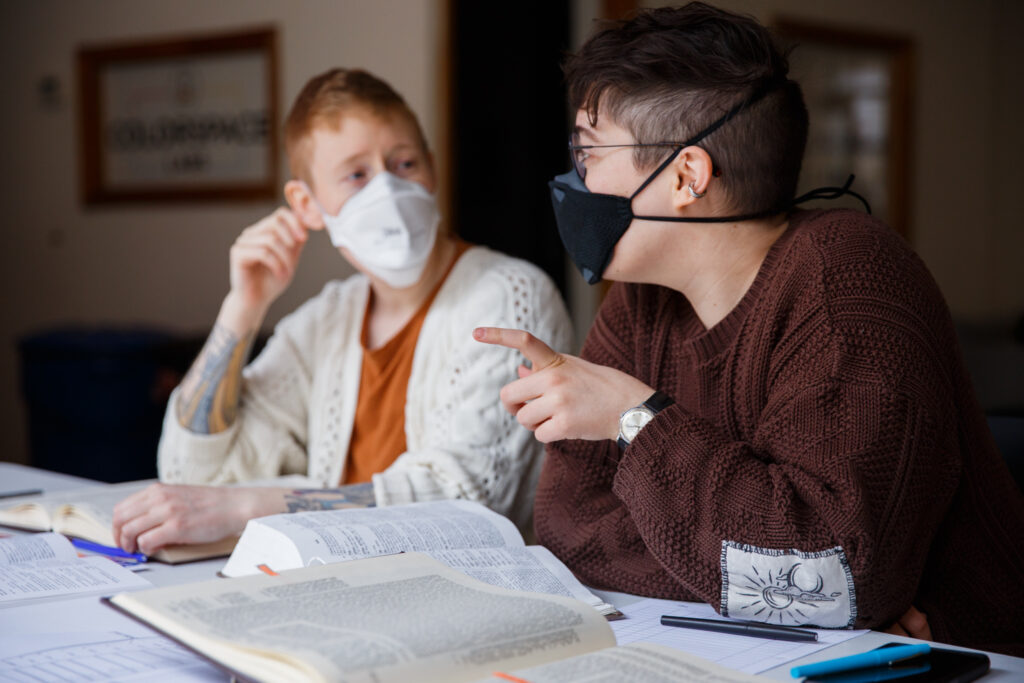Y’all know I love Talmud, and there are few things beyond it that captivate me the way that learning does; grabbing my attention and energy for hours on end, helping me enjoy a sense of ‘flow,’ joy, and simultaneous presence and transcendence. Another thing that makes me feel this way is comic books. Each of these texts—comics and Talmud—and the cultures that surround them have welcomed me into new worlds, intricate and imaginative expressions of realities not-yet created.
As a young person there were two genres that captivated me: fantasy and science fiction, and theology. As a fairly odd high schooler, I had a deep love for reading Tolkien and Rabbi Joseph B. Soloveitchik; my favorite books as a teenager were Harry Potter (yes, a problematic fave!) and Halakhic Man. I used to think that this passion that I had for fantasy and theology were two sides of the same coin: escapism. Many have told me—and I believed them!—that my desire to have my nose in a book and my heart in another world was all about leaving this world. “Put that book down and be present!” people would command. Something always felt true and untrue to me about that.
A focus on an alternate world, on an imagined utopia, can distract us from the world that is, allowing us to accept and tolerate injustices as we turn our attention to other-worldly planes of existence rather than work to upend the conditions around us. I’ve felt this in my own life when I’ve stayed up late reading comics to avoid reading the news, or when I’ve imagined myself as a protagonist in the Marvel Universe or any other parallel fictitious world to help me ‘get through’ the reality of where I am. (Of course, I was a ‘mutant’ and found comrades among my fellow homo superior students at Xavier’s School for Gifted Youngsters.) When we transport ourselves into another place, our imaginations can serve to simply ordain the status quo, numbing us to pain and suffering as we turn our attention to the transcendent and other-worldly instead of what is in the here and now. This is a critique that can be similarly lodged at halakha.
But fantasy does more than just bring us somewhere else. Last week, I was deep into a juicy beach read, The New Mutants: Superheroes and the Radical Imagination of American Comics by Ramzi Fawaz, that gave me new language for an aspect of my beloved comic books and the world-building power that they hold that I’ve been thinking about quite often in recent months. Fawaz, drawing on the wisdom of cultural critics, fantasy/sci-fi creators, and an analysis of American comic books in the 20th century, claims that fantasy is a specific and unique form of creating fiction that “invents or describes things that do not actually exist with the hope of expanding what is imaginable at a given historical moment” (26). He lifts up theorists like Karl Marx and Thomas Moore who use the conceptual language of “utopia” to help us “produce maps of alternate worlds that resist the limits of the present, especially those imposed by hierarchy.”
In other words, instead of transporting us into another world (through “escapism”), fantasy brings the somewhere else to us. In this read, speculative fiction has the ability to transform our world as we expand our view of what is possible. I know so many of us can relate to the power of encountering new ways of being in a work of fantasy or science fiction that sheds light on a different way of being, thinking, or living that transforms our consciousness. Tremendous works and a ton of gorgeousness has been written about the power of science fiction / fantasy / speculative fiction to transform, ground, and inspire prophetic movement work, in recent years especially by Walidah Imarisha and adrienne maree brown, among many others [1]. Walidah Imarisha writes in a 2015 essay “Rewriting the Future: Using Science Fiction to Re-Envision Justice:”
“Visionary fiction offers social justice movements a process to explore creating those new worlds (although not a solution—that’s where sustained mass community organizing comes in). I came up with the term “visionary fiction” to encompass the fantastical cross-genre creations that help us bring about those new worlds. This term reminds us to be utterly unrealistic in our organizing, because it is only through imagining the so-called impossible that we can begin to concretely build it. When we free our imaginations, we question everything. We recognize none of this is fixed, everything is stardust, and we have the strength to cast it however we will.”
As I read this meditation on the power of world-building, I can’t help but see a description of not only ‘visionary fiction’ (a term for this speculative genre coined by Imarisha) but also of halakha, of the discourse and body of knowledge and culture often referred to as “Jewish law.” This kind of world-making—the imagining of new worlds is what drew me to halakhic thinking and theory. In my high-school fave, Halakhic Man, Soloveitchik writes:
“Halakhic man, well furnished with rules, judgments, and fundamental principles, draws near the world with an a priori relation. His approach begins with an ideal creation and concludes with a real one. To whom may he be compared? To a mathematician who fashions an ideal world and then uses it for the purpose of establishing a relationship between it and the real world… The essence of the Halakhah, which was received from God, consists in creating an ideal world and cognizing the relationship between that ideal world and our concrete environment.“
Halakha is, at its core, the sacred process of Jewish world-making, of mapping new imagined potential onto the world that is that reflects the highest ideals of what we think the world should be. The process of halakha invites us to create an imagined ideal world—a fantasy—and bring it into the material world that we occupy; it is a visionary fiction. The fictitious nature of halakha, though, does not undermine the power of its project, nor does it convey that we are doomed to merely escape this world through it, though many do, including myself at times. If we acknowledge the power of fiction and fantasy that is presented to us by Imarisha and others, we can see that It is precisely through the fictions of halakha that we cultivate our imaginations, breathing new forms of reality into being each time we study and engage in the transcendent discourse of halakha.
Queer and trans folks, Black and Indigenous folks, and all people who are marginalized, subjugated, and unserved by the status quo have always been at the forefront of imagining and envisioning these new worlds in the realm of visionary fiction. So must it be with halakha. [2] Certainly the forms and the subject matter of these expressions of our imagination are truly different, but the notion that we can help bring a more just, more sacred, more liberated, more G!dly world into being is truly radical all the same. As Soloveitchik writes elsewhere: “Out of the sources of Halakha, a new world view awaits formulation (The Halakhic Mind, p. 102). May it be so! May we, in this approaching month of Elul and beyond, turn our hearts to our imaginations—our ‘svara’—where the magical world-building potential of our tradition and movements intersects, and may we feel a moment or two of joyful, fantastic, enchantment in the process.
[1] For some of my favorite essays featuring this powerful work, 2015 essay “Rewriting the Future: Using Science Fiction to Re-Envision Justice” by Walidah Imarisha (2015) and the 2017 article “The Fictions and Futures of Transformative Justice: a conversation with the authors of Octavia’s Brood” by Walidah Imarisha, Alexis Gumbs, Leah Lakshimi Piepzna-Samarasinha, adrienne maree brown, and Mia Mingus.
[2] I’m so grateful to so many SVARA-niks and chevrutot for exploring these themes in our learning over the past several years as they apply to Talmud and halakha. I’ve learned so much from R’ Mónica Gomery about Talmud as a project of speculative fiction, and am grateful for a recent chevruta with Koach Baruch Frazier and Kendra Watkins in which they shared about afrofuturism as a lens through which to understand the Talmud’s agenda that they’re dreaming and scheming about in their learning and teaching.







